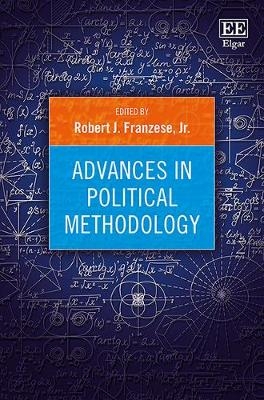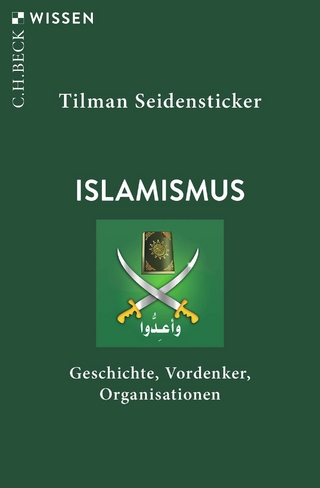
Advances in Political Methodology
Edward Elgar Publishing Ltd (Verlag)
978-1-78347-485-1 (ISBN)
This research collection offers a 34-article tour of recent advances and the current state of 5 important and booming areas of empirical methodology: Bayesian methods; modelling of temporal duration, dependence, and dynamics; network-analytic methodology; text, classification, and big-data analytic methods; methods for nonparametric and design-based causal inference. These prominent articles, written by leading scholars, break new ground and provide definitive statements of the current best practices in those respective areas. Together they describe the cutting-edge profile of modern empirical methodology for applied empirical analysis in political science. This is an essential resource for those studying and researching political methodology.
Edited by Robert J. Franzese Jr., Professor of Political Science, University of Michigan, and Fellow and 15th President, Society of Political Methodology, Washington University in St. Louis, US
Contents:
Research ReviewRobert J. Franzese Jr.
PART IADVANCES IN BAYESIAN METHODS
1. Simon Jackman (2000), ‘Estimation and Inference via Bayesian Simulation: An Introduction to Markov Chain Monte Carlo’, American Journal of Political Science, 44 (2), April, 375–404
2. Joshua Clinton, Simon Jackman and Douglas Rivers (2004), ‘The Statistical Analysis of Roll Call Data’, American Political Science Review, 98 (2), May, 355–70
3. Richard Traunmüller, Andreas Murr and Jeff Gill (2015), ‘Modeling Latent Information in Voting Data with Dirichlet Process Priors’, Political Analysis, 23 (1), Winter, 1–20
4. Yair Ghitza and Andrew Gelman (2013), ‘Deep Interactions with MRP: Election Turnout and Voting Patterns Among Small Electoral Subgroups’, American Journal of Political Science, 57 (3), July, 762–76
5. Devin Caughey and Christopher Warshaw (2015), ‘Dynamic Estimation of Latent Opinion Using a Hierarchical Group-Level IRT Model’, Political Analysis, 23 (2), Spring, 197–211
PART II ADVANCES IN TIME-SERIES, TIME-SERIES-CROSS-SECTION/PANEL, AND EVENT-HISTORY/DURATION MODELLING
6. Janet M. Box–Steffensmeier and Bradford S. Jones (1997), ‘Time Is of the Essence: Event History Models in Political Science’, American Journal of Political Science, 41 (4), October, 1414–61
7. Frederick J. Boehmke, Daniel S. Morey and Megan Shannon (2006), ‘Selection Bias and Continuous-Time Duration Models: Consequences and a Proposed Solution’, American Journal of Political Science, 50 (1), January, 192–207
8. Jude C. Hays, Emily U. Schilling and Frederick J. Boehmke (2015), ‘Accounting for Right Censoring in Interdependent Duration Analysis’, Political Analysis, 23 (3) Summer, 400–14
9. Jude C. Hays and Robert J. Franzese, Jr. (2009), ‘A Comparison of the Small-Sample Properties of Several Estimators for Spatial-Lag Count Models’, paper submitted at the 2009 Summer Meeting of The Society of Political Methodology, New Haven, CT, USA, July 23–5, i, 1–27
10. Patrick T. Brandt, Michael Colaresi and John R. Freeman (2008), ‘The Dynamics of Reciprocity, Accountability, and Credibility’, Journal of Conflict Resolution, 52 (3), June, 343–74
11. Patrick T. Brandt, John R. Freeman and Philip A. Schrodt (2011), ‘Real Time, Time Series Forecasting of Inter- and Intra-State Political Conflict’, Conflict Management and Peace Science, 28 (1), February, 41–64
12. Daniel Stegmueller (2013), ‘Modeling Dynamic Preferences: A Bayesian Robust Dynamic Latent Ordered Probit Model’, Political Analysis, 21 (3), Summer, 314–33
13. Xun Pang (2014), ‘Varying Responses to Common Shocks and Complex Cross-Sectional Dependence: Dynamic Multilevel Modeling with Multifactor Error Structures for Time–Series Cross–Sectional Data’, Political Analysis, 22 (4), Autumn, 464–96
14. Robert J. Franzese, Jr. and Jude C. Hays (2008), ‘Empirical Models of Spatial Interdependence’ in Janet M. Box-Steffensmeier, Henry E. Brady and David Collier (eds), Oxford Handbook of Political Methodology, Oxford, UK: Oxford University Press, Part VII, Chapter 25, 570–604
15. Robert J. Franzese, Jr., Jude C. Hays and Scott J. Cook (2016), ‘Spatial- and Spatiotemporal-Autoregressive Probit Models of Interdependent Binary Outcomes’, Political Science Research and Methods, 4 (1), January, 151–73
PART III ADVANCES IN NETWORK ANALYSIS
16. B. A. Desmarais and S. J. Cranmer (2012), ‘Statistical Mechanics of Networks: Estimation and Uncertainty’, Physica A: Statistical Mechanics and it’s Applications, 391 (4), February, 1865–76
17. Bruce A. Desmarais and Skyler J. Cranmer (2012), ‘Micro-Level Interpretation of Exponential Random Graph Models with Application to Estuary Networks’, Policy Studies Journal, 40 (3), August, 402–34
18. Bruce A. Desmarais, Jeffrey J. Harden and Frederick J. Boehmke (2015), ‘Persistent Policy Pathways: Inferring Diffusion Networks in the American States’, American Political Science Review, 109 (2), May, 392–406
19. Jeff Gill and John R. Freeman (2013), ‘Dynamic Elicited Priors for Updating Covert Networks’, Network Science, 1 (1), April, 68–94
20. Jude C. Hays, Aya Kachi and Robert J. Franzese, Jr. (2010), ‘A Spatial Model Incorporating Dynamic, Endogenous Network Interdependence: A Political Science Application’, Statistical Methodology, 7 (3), May, 406–28
21. Robert J Franzese, Jr., Jude C. Hays and Aya Kachi (2012), ‘Modeling History Dependence in Network-Behavior Coevolution’, Political Analysis, 20 (2), Spring, 175–90
PART IV ADVANCES IN TEXT-ANALYTIC, CLASSIFICATION AND BIG-DATA METHODS
22. Phillip A Schrodt and David Van Brackle (2013) ‘Automated Coding of Political Event Data’ in V.S. Subrahmanian (ed.), Handbook of Computational Approaches to Counterterrorism, Chapter 2, New York, USA: Springer, 23–49
23. Justin Grimmer and Gary King (2011), ‘General Purpose Computer-Assisted Clustering and Conceptualization’, Proceedings of the National Academy of Sciences, 108 (7), February, 2643–50
24. Vito D’Orazio, Steven T. Landis, Glenn Palmer and Philip Schrodt (2014), ‘Separating the Wheat from the Chaff: Applications of Automated Document Classification Using Support Vector Machines’, Political Analysis, 22 (2), Spring, 224–42
25. Justin Grimmer and Brandon M. Stewart (2013), ‘Text as Data: The Promise and Pitfalls of Automatic Content Analysis Methods for Political Texts’, Political Analysis, 21 (3), Summer, 267–97
26. Martin Elff (2013), ‘A Dynamic State-Space Model of Coded Political Texts’, Political Analysis, 21 (2), Spring, 217–32
27. Christopher Lucas, Richard A. Nielson, Margaret E. Roberts, Brandon M. Stewart, Alex Storer and Dustin Tingley (2015), ‘Computer Assisted Text Analysis for Comparative Politics’, Political Analysis, 23 (2), Spring, 254–77
PART V ADVANCES IN NONPARAMETRIC & DESIGN-BASED INFERENCE METHODS
28. Jasjeet S. Sekhon (2008), ‘The Neyman-Rubin Model of Causal Inference and Estimation via Matching Methods’, in Janet M. Box-Steffensmeier, Henry E. Brady and David Collier (eds), Oxford Handbook of Political Methodology, Part VI, Chapter 11, Oxford, UK: Oxford University Press, 271–99
29. Jasjeet Sekhon and Rocío Titiunik (2012), ‘When Natural Experiments Are Neither Natural Nor Experiments’, American Political Science Review, 106 (1), February, 35–57
30. Peter M. Aronow and Allison Carnegie (2013), ‘Beyond LATE: Estimation of the Average Treatment Effect with an Instrumental Variable’, Political Analysis, 21 (4), Autumn, 492–506
31. Kosuke Imai, Luke Keele, Dustin Tingley and Teppai Yamamoto (2011), ‘Unpacking the Black Box of Causality: Learning about Casual Mechanisms from Experimental and Observational Studies’, American Political Science Review, 105 (4), November, 765–89
32. Kosuke Imai and Marc Ratkovic (2013), ‘Estimating Treatment Effect Heterogeneity in Randomized Program Evaluation’, Annals of Applied Statistics, 7 (1), 443–70
33. Luke Keele and Rocío Titiunik (2016), ‘Natural Experiments Based on Geography’, Political Science Research and Methods, 4 (1), January, 65–95
34. Luke Keele, Rocío Titiunik and Jose Zubizarreta (2015), ‘Enhancing a Geographic Regression Discontinuity Design Through Matching To Estimate the Effect of Ballot Initiatives on Voter Turnout’, Journal of the Royal Statistical Society: Statistics in Society, Series A, 178 (1), 223–39[17]
Index
| Erscheinungsdatum | 22.07.2018 |
|---|---|
| Reihe/Serie | Elgar Mini Series |
| Verlagsort | Cheltenham |
| Sprache | englisch |
| Maße | 169 x 244 mm |
| Themenwelt | Schulbuch / Wörterbuch ► Lexikon / Chroniken |
| Sozialwissenschaften ► Politik / Verwaltung ► Politische Theorie | |
| Sozialwissenschaften ► Politik / Verwaltung ► Staat / Verwaltung | |
| Wirtschaft ► Volkswirtschaftslehre ► Ökonometrie | |
| ISBN-10 | 1-78347-485-8 / 1783474858 |
| ISBN-13 | 978-1-78347-485-1 / 9781783474851 |
| Zustand | Neuware |
| Haben Sie eine Frage zum Produkt? |
aus dem Bereich


